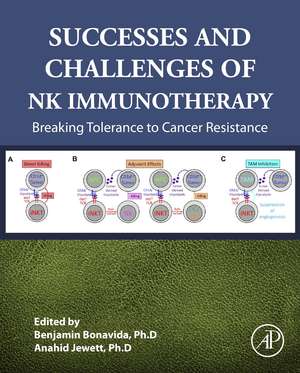Successes and Challenges of NK Immunotherapy: Breaking Tolerance to Cancer Resistance
Editat de Benjamin Bonavida, Anahid Jewetten Limba Engleză Hardback – 24 iun 2021
Written by the leading experts on NK immunotherapy worldwide, this is a valuable resource for researchers, clinicians and members of the biomedical field who are interested in understanding novel and efficient therapies to fight cancers.
- Discusses the unique developmental applications of NK immunotherapy against cancers, which differs greatly from other types of immunotherapies
- Provides up-to-date and highly relevant information through chapters written by the leading researchers in the field
- Presents a significant number of schematic diagrams for easy understanding and reproducibility
Preț: 685.11 lei
Preț vechi: 886.96 lei
-23% Nou
Puncte Express: 1028
Preț estimativ în valută:
131.11€ • 136.05$ • 109.59£
131.11€ • 136.05$ • 109.59£
Carte indisponibilă temporar
Doresc să fiu notificat când acest titlu va fi disponibil:
Se trimite...
Preluare comenzi: 021 569.72.76
Specificații
ISBN-13: 9780128243756
ISBN-10: 0128243759
Pagini: 538
Ilustrații: 60 illustrations (30 in full color)
Dimensiuni: 191 x 235 x 31 mm
Greutate: 1.25 kg
Editura: ELSEVIER SCIENCE
ISBN-10: 0128243759
Pagini: 538
Ilustrații: 60 illustrations (30 in full color)
Dimensiuni: 191 x 235 x 31 mm
Greutate: 1.25 kg
Editura: ELSEVIER SCIENCE
Cuprins
Section 1: Modulation of NK Antitumor Activities1. Engineered Human Pluripotent Stem Cell-Derived NK Cells with Improved Anti-tumor Activity2. The Cancer - NK cell Immunity Cycle3. Immunometabolic reprogramming of NK cells for immunotherapy of solid tumors4. Immunoregulation of NK cells: Similarities and Differences Compared to T cells5. Tracking the decay of TGFb-resistant NK cells identifies an immune clock of innate cell aging
Section 2: Regulation of NK Antitumor Activities6. Oncolytic virus therapy for cancer; role in activation of NK cells7. Rendering NK cells resistant to immune suppression: genetic modification with a dominant negative receptor for TGF-Beta8. Cystatin F, an inhibitor of cysteine cathepsins, regulates the cytotoxicity of NK cells9. The NCR2-PCNA Immune Checkpoint and Natural Killer-based immunotherapy10. Tumor derived soluble human NKG2D ligand mediated perturbations in NK cell metabolism and therapeutic implications11. The expression of high affinity recombinant Fc receptors by engineered natural killer cells to enhance cancer cell killing by ADCC
Section 3: NK Antitumor Immunotherapy12. The many key functions of Natural Killers cells in premalignant and malignant stages of tumorigenesis; when these gatekeepers are gone or defective anarchy ensues13. Phenotypic plasticity: the emergence of cancer stem cells and collective cell migration14. Stem cell-engineered invariant natural killer T cells for cancer immunotherapy15. Natural killer cells in the glioblastoma stem cell niche microenvironment16. CAR-redirected Cytokine-Induced Killer lymphocytes against sarcomas17. The Effect of Natural Killer Cells on HIV-1 Rebound in Humanized Mice
Section 4: NK Antitumor Immunotherapy 218. NK cells are innate actors in the immunosurveillance of melanoma19. Patients with prostate cancer associate with altered features of Natural Killer cells in terms of pro-angiogenic function and M2-like macrophage polarization capacity20. New therapeutic approaches to target malignant gliomas21. Mobilizing Human iNKT cells for Cancer Immunotherapies22. Initial Innate Immune Responses to Tumor Metastasis23. Regulating NK cell homeostasis and function by tumor associated NKG2D ligand MIC24. Natural Killer Cells in Cancer Immunotherapy and Oncolytic Virotherapy
Section 5: General Concluding Remarks and Future Perspectives
Section 2: Regulation of NK Antitumor Activities6. Oncolytic virus therapy for cancer; role in activation of NK cells7. Rendering NK cells resistant to immune suppression: genetic modification with a dominant negative receptor for TGF-Beta8. Cystatin F, an inhibitor of cysteine cathepsins, regulates the cytotoxicity of NK cells9. The NCR2-PCNA Immune Checkpoint and Natural Killer-based immunotherapy10. Tumor derived soluble human NKG2D ligand mediated perturbations in NK cell metabolism and therapeutic implications11. The expression of high affinity recombinant Fc receptors by engineered natural killer cells to enhance cancer cell killing by ADCC
Section 3: NK Antitumor Immunotherapy12. The many key functions of Natural Killers cells in premalignant and malignant stages of tumorigenesis; when these gatekeepers are gone or defective anarchy ensues13. Phenotypic plasticity: the emergence of cancer stem cells and collective cell migration14. Stem cell-engineered invariant natural killer T cells for cancer immunotherapy15. Natural killer cells in the glioblastoma stem cell niche microenvironment16. CAR-redirected Cytokine-Induced Killer lymphocytes against sarcomas17. The Effect of Natural Killer Cells on HIV-1 Rebound in Humanized Mice
Section 4: NK Antitumor Immunotherapy 218. NK cells are innate actors in the immunosurveillance of melanoma19. Patients with prostate cancer associate with altered features of Natural Killer cells in terms of pro-angiogenic function and M2-like macrophage polarization capacity20. New therapeutic approaches to target malignant gliomas21. Mobilizing Human iNKT cells for Cancer Immunotherapies22. Initial Innate Immune Responses to Tumor Metastasis23. Regulating NK cell homeostasis and function by tumor associated NKG2D ligand MIC24. Natural Killer Cells in Cancer Immunotherapy and Oncolytic Virotherapy
Section 5: General Concluding Remarks and Future Perspectives
